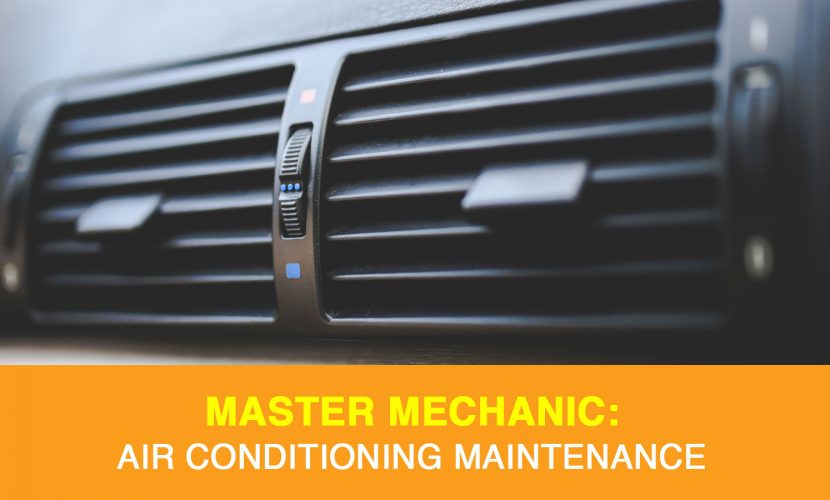
Master Mechanic: Air Conditioning Maintenance
At Master Mechanic, we know how frustrating it can be when your car’s air conditioner isn’t working properly when it’s hot outside. Beyond uncomfortable, it can be borderline unbearable during peak summer months. We want to help you keep your cool at all times, so we’ve outlined the most common reasons your air conditioner may stop working and what to do about it.
The Air Conditioning Is Not as Cold As it Used to Be
When you experience cool–but not cold–air, it’s usually because of low refrigerant levels. If there’s not enough refrigerant in your air conditioning system, it will not produce enough pressure to initiate the clutch. If there’s not enough pressure to initiate the clutch, the compressor cannot begin its cycle.
If your refrigerant levels are adequate, you may have a failed clutch, which prevents the air compressor from working altogether. Your local Master Mechanic will need to test each of these components to find any blocked or broken parts.
My Air Conditioning Feels Warm
When you turn on your air conditioning, you expect one thing: cold air. If your vents aren’t blowing cold air, this most likely indicates a refrigerant leak. A vehicle’s air conditioning system uses refrigerant to cool the car. As refrigerant levels drop because of a leak, it prevents other components in your air conditioner from functioning correctly. Unfortunately, the most common way drivers notice a leak is a lack of cold air in your cabin. Unlike an oil leak that can leave a spot, refrigerant evaporates when exposed to the environment.
If you suspect you might have a refrigerant leak, it’s best to make an appointment with your local Master Mechanic. To diagnose a leak, a trained technician can add a fluorescent dye refrigerant to the system, which will show up under a blacklight. With the right tools, spotting a leak is much easier, and we’ll be able to begin any necessary repairs.
No Airflow from Air Conditioning
When there’s no airflow coming to the cabin, there could be several issues. It’s not as simple to diagnose, and a trained technician will need to look at the different components in your air conditioner until they find exactly what’s wrong.
To begin, your Master Mechanic may look for:
- A blown ventilation fuse: this is the power source for your blower motor, which functions as a fan by pushing air through your vents. A blown ventilation fuse means there’s no power going to the blower motor and airflow in the cabin.
- Damage to the blower motor: if the power source is working, your Master Mechanic will check the blower motor for damage. Blower motors can stop working from regular wear or age and will need to be repaired or replaced.
- A blocked air intake – your vehicle has two places where air enters: one on the exterior and one on the interior to recirculate air. If you have a blockage in either of these intake areas, airflow is prevented from reaching the cabin.
- Damaged belts and hoses – Your car’s air conditioning system is comprised of many hoses and belts that keep it working correctly. If any component leaks, loosens, breaks or becomes blocked, you’re likely to notice a lack of airflow.
If you have the experience, you can try replacing your fuses first. If the problem doesn’t resolve, you’ll want to visit your local Master Mechanic to diagnose it. A replacement or repair is most likely needed, and a trained technician will be able to identify this through a process of elimination.
The Air Conditioning Smells Funny
When you expect refreshing, cold air, and are met with the musty smell of mould or mildew, it’s off-putting, to say the least. As you may have guessed, that smell is due to bacteria growth in your air conditioning or vents. This is a common issue in vehicles that don’t use their air conditioning often or have it off for prolonged periods. More moisture can also build up in systems that undergo excessive use or are on the maximum setting frequently. Bacteria, mould, and fungi that produce a bad odour can form on the evaporator behind the dashboard and blow through your vents.
You can start by replacing your air filter, which can collect dirt, water, dust, and other pollutants. After a time, it can begin to produce an odour and replacing the filter is a quick fix. If this doesn’t help, visit your local Master Mechanic to have the system cleaned. Your Master Mechanic can add an anti-bacterial solution into the evaporator to remove any bacteria–and odours–in the air conditioning system.
The Air Conditioning Makes A Weird Noise
Your air conditioning systems should be relatively quiet when you turn it on. If you hear sudden noises, it’s usually a sign that something is wrong. Odd noises can be something as simple as debris clogged or caught in the unit; it can also indicate a more significant issue that isn’t as easy to repair.
If you hear a grinding or squealing sound, it may mean a bearing is word out and needs to be replaced. If you hear a rattling sound, it may mean that the clutch for the compressor has failed. Without hearing the sound, ourselves, it’s hard to diagnose what the issue is exactly.
If you hear strange noise, it’s best not to use your air conditioning until you visit your local Master Mechanic. You don’t want to make a minor issue worse or cause other components to fail.
Air Conditioning Maintenance Tips
You shouldn’t wait for an issue to arise before you begin maintaining your vehicle’s air conditioner. There are simple things you can do regularly to help keep things running smoothly. These include:
- Running your air conditioner for at least 10 minutes per week, even during winter months. While you may not need the A/C to keep warm, this will maintain gas pressure and keep the compressor functioning. When you do this, be sure to turn it to its highest fan speed and coolest setting. The good news is, many drivers already do this to defog their windshield.
- Running you’re A/C in defrost mode for about 5 to 10 minutes will help clear out excess moisture and prevent bacteria or odours from forming.
Air conditioning should be cold. It’s as simple as that. If it’s not, contact your local Master Mechanic to have a certified technician test the system pressure, and check components for blockages, breaks, or leaks. No matter what problems you’re experiencing with your air conditioning: don’t lose your cool! We’ll quickly diagnose it and get you back on the road in no time.

